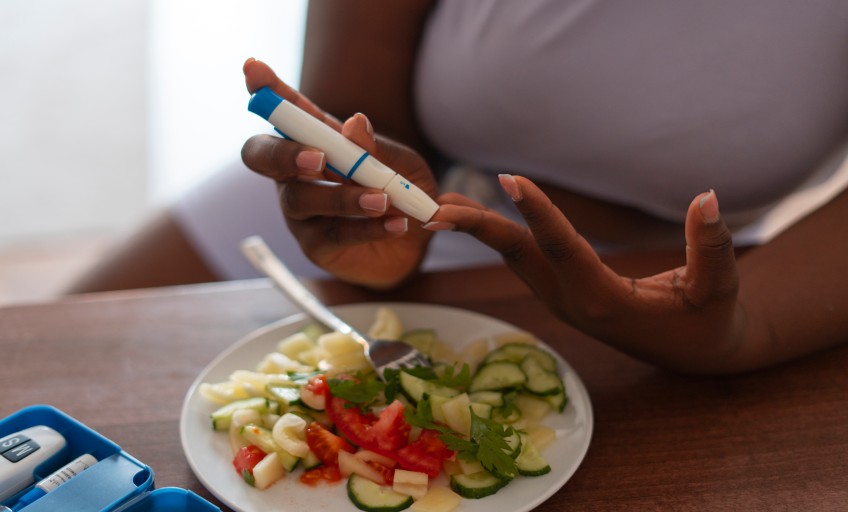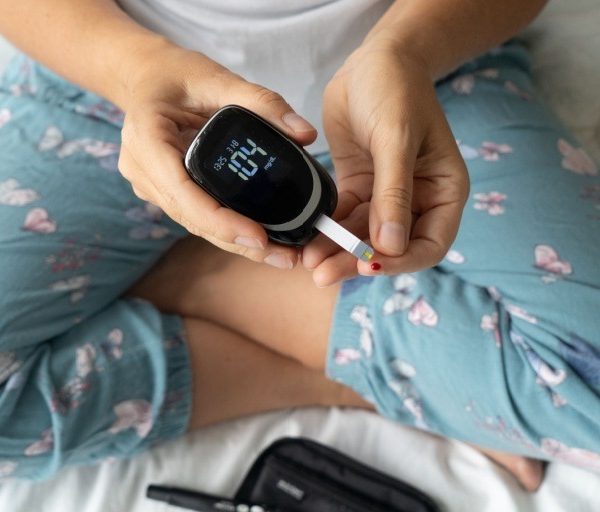Key Takeaways
- Fasting can benefit people with diabetes but requires careful management.
- Intermittent fasting, alternate-day fasting, and time-restricted eating can help with inflammation, lower cholesterol, and aid weight management. However, the long-term safety of fasting for people with diabetes is still under research.
- People with diabetes should monitor their blood glucose levels frequently, follow a balanced diet, and avoid sugary or caffeinated drinks while fasting.
Doctors don’t commonly recommend fasting, but it can be helpful for diabetes management.
Diets are temporary, and most diet plans fail to meet the hype. Instead, you should focus on nutrition. What you eat, how much you eat and even the intervals between your meals can determine how well you manage your health, especially for people with diabetes.
What you need to know:
- Understanding fasting and diabetes
- Definition of fasting
- Diabetes overview and challenges
- Can people with diabetes fast?
- Types of fasting
- Benefit of fasting with diabetes
- Impact of fasting in people with diabetes: Potential risks and considerations for people with diabetes
- Expert recommendations and guidelines
- Tips for safe fasting practises for people with diabetes
- Modified fasting approaches and healthier alternatives for people with diabetes
Understanding fasting and diabetes
Intermittent fasting or time-restricted eating can let you keep your daily calorie intake within limits. This allows you to maintain healthy body weight and helps people with type-2 diabetes control their blood sugar levels efficiently. However, people with diabetes must consult healthcare professionals for a guided plan to avoid serious risks such as hypoglycemia.
Definition of fasting
Fasting is when a person abstains from eating and sometimes drinks any fluid. This can range from 6 to 72 hours depending on factors like meal plan, purpose, etc. Without guidance, fasting can be tricky for people with diabetes due to the effect that it has on one’s blood sugar levels.
Diabetes overview and challenges
Diabetes is a metabolic disease where the body cannot control its blood glucose levels. It is a chronic disease that, if unchecked, can seriously damage other organs of the body, such as the eyes, heart and kidneys. For a person with diabetes, the main challenge is avoiding hypoglycemia or hyperglycemia, be it a result of negligence or lack of blood glucose monitoring. On a larger scale, it is a growing concern, with over 420 million people currently living with the disease globally, and an estimated 1.5 million deaths are caused by diabetes yearly.
Can people with diabetes fast?

Fasting has the potential to benefit people with diabetes, but your condition determines what measures need to be taken. Compared to type-2 diabetes, people with type-1 diabetes are at a greater risk of hypoglycemia or hyperglycemia if they don’t adjust their insulin intake carefully. People with type-2 diabetes and women with gestational diabetes who are not on insulin can reap the benefits of fasting as long as their doctors clear it.
Types of fasting

Over the years, experts have found various ways to fast. Individuals may choose from –
- Intermittent fasting– This pattern involves fasting for a time that’s 12 hours or longer.
- Time-restricted eating– This pattern allows a person to eat for a limited time period, between 8 to 12 hours.
- Alternate day fasting– In this pattern, a person eats on alternate days and fasts by consuming 0-500 calories on other days.
- Periodic fasting– In this method, a person sets the number of days they fast in a week while sticking to their regular eating routine for the rest of the days.
Benefit of fasting with diabetes
More research is needed to know if fasting is safe long-term. However, fasting with diabetes provides the following general health benefits:
Helps with inflammation
It could reduce inflammation, a process by which your body’s white blood cells protect you from injury or infection from outside invaders, such as bacteria and viruses.
Lowers cholesterol
Some studies suggest that intermittent fasting may lower low-density lipoprotein (LDL) or ‘bad’ cholesterol and increase HDL or ‘good’ cholesterol, thus decreasing the risk for heart disease.
Aids weight management
It can help with weight management. If you are overweight or obese, reducing weight can help lower your A1c level (a gauge of your blood sugar control over the last 2-3 months) and lower your risk for heart disease.
Impact of fasting in people with diabetes: Potential risks and considerations for people with diabetes
During fasting, the liver breaks down glycogen and releases glucose into the bloodstream. In people with diabetes, there is a risk of blood sugar levels shooting up if the body is not receiving enough insulin. On the other hand, if you are on insulin, unregulated intake can drop blood sugar below critical levels. Healthcare guidance at each step and continuous glucose monitoring are fundamental in integrating fasting into the routine of people with diabetes.
Expert recommendations and guidelines
According to Dr Mangesh Tiwaskar, Diabetes Specialist, Mumbai, doctors usually do not recommend fasting due to its potential risks if patients aren’t diligent. People with diabetes must be up-to-date with their blood tests and consult their doctors to make the necessary dietary changes to practise fasting.
Tips for safe fasting practises for people with diabetes:
Fasting may not be the first recommended approach by specialists, but it can be integrated safely into your routine.
- Consult your doctor before choosing any plan.
- You should be equipped to monitor your blood glucose levels at regular intervals at home. Additionally, get regular blood tests.
- Include a balanced diet and watch how much you eat. Include nutrient-rich options such as vegetables, fruits, curd and pulses.
- Include foods with lower glycemic index and those absorbed slowly by the body.
- Avoid sugary or caffeinated drinks, which can cause dehydration while breaking your fast.
Modified fasting approaches and healthier alternatives for people with diabetes
Although intermittent fasting is the commonly chosen method, it is advisable to consult a healthcare professional to learn about other approaches to fasting or modifications you can make.
Since fasting can pose the risk of hypoglycemia or diabetic ketoacidosis, it may be wise to choose healthier alternatives like watching your calories, managing stress better, having an active lifestyle and getting adequate sleep. This will allow you to minimize the risks associated with fasting and improve your overall daily diabetes management.
Stay tuned to the Activ Living Community. Keep up to date with the latest health tips and trends through expert videos, podcasts, articles, and much more in nutrition, fitness, mindfulness, and lifestyle conditions like Asthma, Blood Pressure, Cholesterol, and Diabetes. Activ Living ke saath sahi sehat ki shuruaat ABHIkaro.
You may also be interested in the following blogs:
- How Does Insulin Therapy Make Life Easier For People With Diabetes?
- Sedentary Lifestyle And Diabetes: Transform Passive Life To Active Life
Popular Searches
How to lower blood pressure | Fruits good for liver | Unhealthy foods | Ragi Benefits | Basal Metabolic Rate | Acupressure points for High Blood Pressure | Ayurvedic medicine for blood pressure | How to control cholesterol at home | Homeopathy for Asthma | Biological Age | Home remedies for TB | Natural beta blockers | Negative effects of internet | Types of walking | Blood pressure calculator | Blood sugar calculator | BMI Calculator





 1800-270-7000
1800-270-7000









